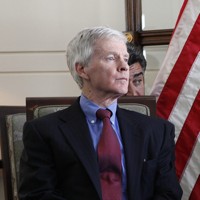This week, the news broke that Ryan Crocker, arguably the finest U.S. diplomat of his generation, was resigning from his post as the U.S. ambassador to Afghanistan. Crocker, who came out of retirement to serve as ambassador in Kabul, will be stepping down this summer, a year earlier than scheduled. The news is a blow to U.S. efforts to surround the military strategy in Afghanistan with a diplomatic framework to stabilize the country.
As such, it is the latest setback in a war that has been a humbling experience for both the United States and its Western allies. The most advanced military and economic powers on Earth have thus far failed to bring peace to Afghanistan after a decade of trying. When I speak to U.S. military officers and other Americans about why we have failed in Afghanistan, among the various explanations that are advanced, I often hear the argument that we have lacked a “credible Afghan partner.”
We Americans, though, should take a long hard look in the mirror and ask ourselves whether or not we ourselves have been a credible partner for Afghanistan. For when you look at the U.S. and allied intervention in that country from the perspective of the Afghan government, it’s hard not to draw a similar conclusion.

